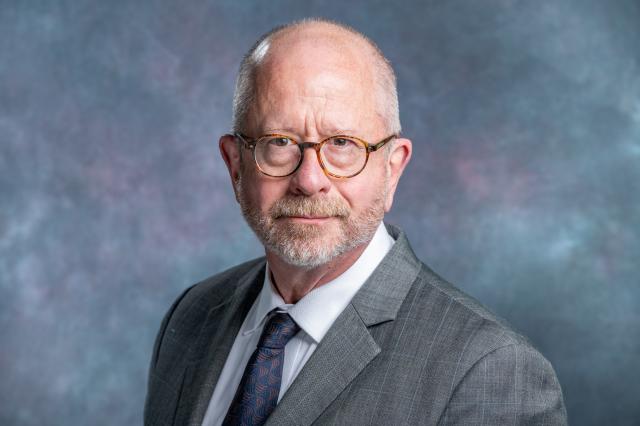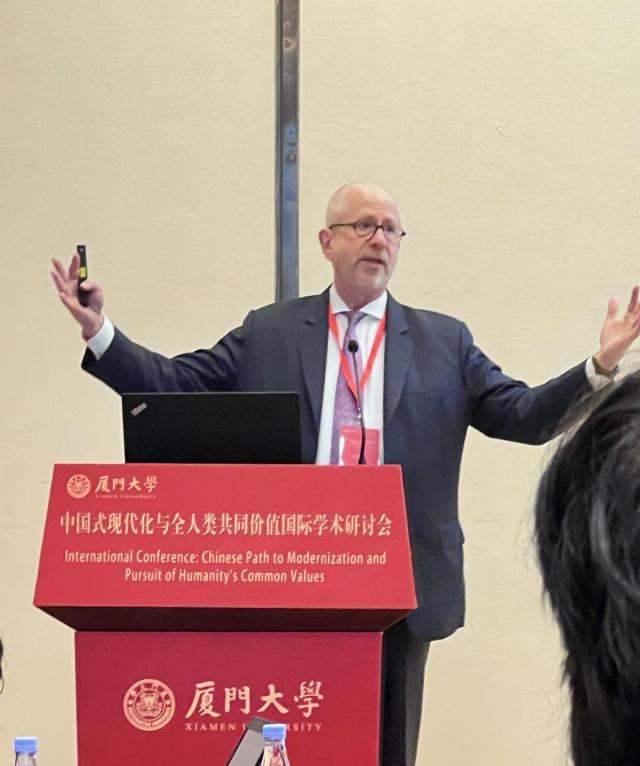Kean Provost Delivers Keynote Address at Conference in China

Kean Provost and Senior Vice President for Academic Affairs David S. Birdsell, Ph.D., discussed areas of potential cooperation between the U.S. and China at a conference held at Xiamen University, one of the top institutions of higher education in China.
While acknowledging the “times of tension” currently existing between the two global powers, Birdsell, in an interview prior to the event, said there are numerous areas where the two nations can find room to work together, specifically climate change, pandemic response, and debt relief for less-developed nations.

“My case is that understanding is improved and tensions reduced through mutual effort to achieve goals that have win-win propositions, not only for the U.S. and China but for the broader world beyond,” he said.
Birdsell, who joined Kean in 2021 from Baruch College in New York City, is a noted political communication scholar. He is frequently quoted by news media on issues related to political communication, as well as communication issues involving information technology.
He was invited by Xiamen University, among the top 25 Best Global Universities in China as ranked by U.S. News & World Report, to speak on Wednesday, April 5 at the International Conference: China's Path to Modernization and Pursuit of Common Values for Humanity, held to mark the prestigious research university’s 100th anniversary. He also gave an address to students and faculty in the university's School of Public Affairs.
Birdsell noted that the conference takes place “at a time when China is asserting itself diplomatically, militarily and economically in a number of ways that it had not before” in part, he said, because China believes the U.S. is trying to keep it from prospering. But he said the two nations share many interests.
“It is surely the case that there are areas where we can engage in fruitful collaborations,” Birdsell said.
Birdsell discussed climate change and the battle against catastrophic warming. He said the U.S. and China share the similarities of vast coastlines and large cities, with infrastructure vulnerable to flooding, and both would suffer if the planet continues to grow warmer.
He said one step could be for the two countries to tone down competition in the production of batteries and photovoltaic materials, used in solar energy, through ways such as making older technology available to less-wealthy nations.
“Both countries want to dominate the field in those industries, but there are ways to think about how you use last-generation technologies,” he said.
Birdsell also spoke about the two countries’ response to the next potential pandemic.
“Looking past Covid, rather than trying to focus on whatever did or didn’t cause that virus to go global, we should look into what we learned from the pandemic, its effect on supply chains, populations and certain classes of the population,” he said.
Birdsell said he would like to see China “more willing to share information with global health authorities.”
“Think not about what you did or did not do about Covid, but what global data sets are available,” Birdsell said.
Birdsell's address also touched on opportunities that could be created if debt relief were granted to developing nations by international institutions such as the World Bank and International Monetary Fund.
Doing so could help the environment, he said, noting that many developing countries lack the ability to build modern industrial facilities that could reduce harmful emissions.
“It is an interconnected story between capital debt, climate change, and the ability to participate in a global economy,” Birdsell said.
The Kean provost noted that with his address, he sought to “point to the kind of things that can be done to create benefit globally.”
“There are just a lot of wins available,” he said.